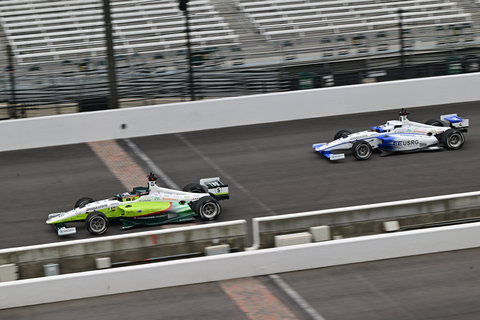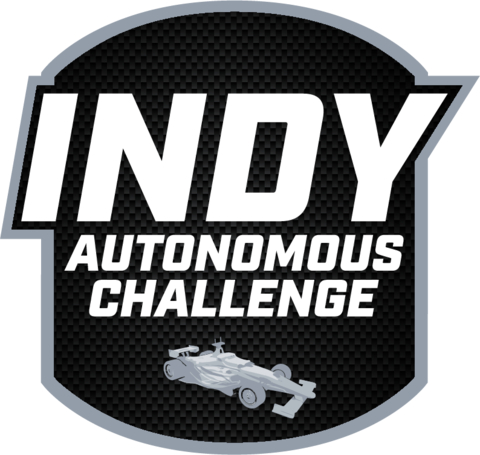
The PoliMOVE-MSU and the KAIST autonomous racecars passing the Yard of Bricks at the Indianapolis Motor Speedway (Photo: Business Wire)

The PoliMOVE-MSU and the KAIST autonomous racecars passing the Yard of Bricks at the Indianapolis Motor Speedway (Photo: Business Wire)
-
Image
-
Full Size
-
Small
-
Preview
-
Thumbnail
-

-
Image
-
Full Size
-
Small
-
Preview
-
Thumbnail
-
INDIANAPOLIS--(BUSINESS WIRE)--On Friday September 6th, 2024, the Indy Autonomous Challenge (IAC), a global leader in high-speed autonomy, held the seventh edition of its autonomous racing competition returning to the famed oval at Indianapolis Motor Speedway and setting new world autonomous speed records for top speed on a racetrack (184 mph / 296 kph) and fastest passing overtake (180 mph / 290 kph). PoliMOVE-MSU (Politecnico di Milano, Michigan State University) won the passing competition with a record-setting overtake, and Cavalier Autonomous Racing (University of Virginia) emerged victorious with world record speed in the time trials competition. These two teams delivered remarkable performances powered by cutting-edge AI driver software. Their success in outpacing eight other competitive university teams highlighted the exciting future of automotive innovation.
In a fiercely contested finale of the passing competition, PoliMOVE-MSU and UNIMORE Racing (University of Modena and Reggio Emilia) raced neck and neck for 30 laps, executing a total of 19 overtakes at increasingly higher speeds. In a dramatic finish, PoliMOVE-MSU clinched victory with a final record-setting overtake, reaching (180 mph / 290 kph). During the race, the two competitors demonstrated a ground-breaking feat of vehicle control, stability, and safety, executing a controlled stop from 145 mph. Entering turn one the UNIMORE racecar lost GPS connectivity and was able to execute a safe stop through the turn by transitioning to LiDAR based localization. The PoliMOVE-MSU AI driver detected their opponent’s behaviour while trailing at a distance of only (80 ft / 25 m) and was able to come to a safe stop avoiding a crash and maintaining full vehicle stability. These manoeuvres underscore the incredible safety capabilities of modern autonomous systems. For comparison, the NHTSA recommended safety distance between vehicles traveling at (70 mph / 113 kph) on a highway is (300 ft / 90 m).
Cavalier Autonomous Racing won the time trial competition clocking a 52.628 second lap on the historic 2.5-mile oval with an average speed of (171.012 mph / 273.619 kph) pulling lateral G of 2.25 in the turns. During their winning lap, Cavalier Autonomous Racing set a new world record for autonomous speed on a racetrack reaching (184 mph / 296 kph). This achievement also marked the first time a U.S.- based team has reached the top of the podium at an Indy Autonomous Challenge competition.
“Returning to Indianapolis Motor Speedway three years after our inaugural race in 2021 is deeply meaningful to our teams,” continued Mitchell. “We’ve achieved many milestones over the years – but this competition’s combination of world record-breaking autonomous speed and incredible crash avoidance safety stops pushed the boundaries of high-speed autonomy further than ever before.”
“Congratulations to all nine of the university teams who competed at the Racing Capital of the World, especially PoliMOVE-MSU and Cavalier Autonomous Racing on their record-setting victories,” said IMS President J. Douglas Boles. “IMS was built 115 years ago as a proving ground for automotive innovation, and we are proud to continue that tradition today with the incredible innovations in AI and automation being achieved by the Indy Autonomous Challenge.”
Nine teams, representing 13 universities from across three continents, competed with identical IAC AV-24 racecars at the 2024 Indy Autonomous Challenge. The IAC AV-24, the fastest autonomous racecar in the world, was at the heart of the competition. Featuring state-of-the-art hardware , the AV-24 represents a major leap forward in high-speed autonomous mobility. Competing teams included:
- AI Racing Tech (ART) – University of California, Berkeley, with University of Hawai’i, University of California, San Diego, and Carnegie Mellon University (U.S.)
- Autonomous Tiger Racing (ATR) – Auburn University (U.S.)
- Cavalier Autonomous Racing (CAR) – University of Virginia (U.S.)
- IU Luddy – Indiana University Luddy School of Informatics (U.S.)
- KAIST – Korea Advanced Institute of Science and Technology (South Korea)
- PoliMOVE-MSU – Politecnico di Milano, Michigan State University, and University of Alabama (U.S., Italy)
- Purdue AI Racing (PAIR) – Purdue University (U.S.)
- UNIMORE Racing – University of Modena and Reggio Emilia (Italy)
- TUM Autonomous Motorsport – Technische Universität München (Germany)
While Caltech Autonomous Systems and Technologies (CAST) Racer, the newest team to join the Indy Autonomous Challenge, did not participate in the competition, they made their presence known by unveiling their new livery to the public.
“Indiana has become a hub for technology innovation that is power the economy of the future,” said David Watkins, SVP of Entrepreneurship & Small Business at the Indiana Economic Development Corporation. “It’s been an honor to host and support the global AI talent network of 150 PhD students and faculty that make up the Indy Autonomous Challenge paddock as they’ve made the Hoosier state their home away from home this Summer preparing to make history at Indianapolis Motor Speedway.”
In addition to the competition, the IAC hosted an AI & Automation Summit, moderated by CNBC Senior National Correspondent Brian Sullivan. Organized in partnership with the Indiana Economic Development Corporation, the summit brought together leaders from industry, government, and academia to discuss the future of AI in the physical world, with a focus on autonomous mobility.
Simultaneously, more than 1,500 high school students from across Indiana engaged with hands-on exhibits in the STEM Zone, designed to inspire the next generation of STEM talent. As part of this initiative, the IAC, in collaboration with Indiana-based streetwear brand MELI, distributed limited edition t-shirts celebrating the intersection of fashion, technology, and Indiana’s innovation ecosystem.
For more information about the Indy Autonomous Challenge, please visit www.IndyAutonomousChallenge.com.
Note to editors: B-roll of the Autonomous Challenge @ IMS 2024 is available here. High-resolution images and additional information about the Indy Autonomous Challenge can be found on the IAC Media Page.
Contacts
marc.ferlet@indyautonomouschallenge.com


